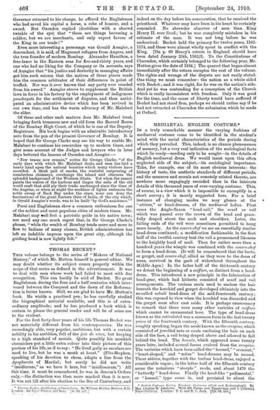THOMAS BECKET.* THIS volume belongs to the series of "Makers
of National History," of which Mr. Hutton himself is general editor. We may doubt whether its subject comes properly within the scope of that series as defined in the advertisement. It was to deal with men whose work had failed to meet with due recognition. This can hardly be said of Becket. No great Englishman during the four and a half centuries which inter- vened between the Conquest and the dawn of the Reforma- tion is better known. Still, we are glad to have Mr. Hutton's book. He wields a practised pen ; he has carefully studied the biographical material available, and this is of extra- ordinary amplitude; and he has produced a book which is certain to please the general reader and will be of some use to the student.
For the first forty-four years of his life Thomas Becket was not materially different from his contemporaries. He was exceedingly able, very popular, ambitious, but with a certain nobility in his ambition, full of the joie de vivre, but keeping to a high standard of morals. Quite possibly his monkish chroniclers put a little extra colour into their picture of this portion of his life, as if to say : "He lived gaily as seculars are used to live, but he was a monk at heart." (Fitz-Stephen, speaking of his devotion to chess, adapts a line from the Apophoreta of Martial ; but surely he did not write "insidiorum," as we have it here, but " insidiosorum.") All this time, it mast be remembered, he was in deacon's Orders only, the distinction was then more marked than it is now. It was not till after his election to the See of Canterbury, and • Thomas Becket, Archbishop of Canterbury. By William Holden glittsn,B,p, kprtdon ; Sir Islas Pitlina and Ssps. ps. dd. Intl indeed on the day before his consecration, that he received the priesthood. Whatever may have been in his heart lie certainly concealed. No shrewder observer of - men than King Henry II. ever lived ; but he was completely mistaken in his estimate of the man. It was not long before he was undeceived. Becket held the primacy for twelve years, 1162- 1174, and these were almost wholly spent in conflict with the King. [On p. 69 Henry's return to England should have been dated January 25th, 1162(3). To the Constitutions of Clarendon, which certainly belonged to the following year, Mr. Hutton gives the date of 1164.] The quarrel that began almost immediately after the return occupies the rest of the volume. The rights and wrongs of the dispute are not easily stated. One thing we must remember : the nation as a whole sided with Becket ; and it was right, for he was on the nation's side. And yet he was contending for a conception of. the Church which is really inconsistent with freedom. Only it was good for the time, and the cause of liberty would have suffered if Becket had not stood firm, perhaps we should rather say if he had not retracted at Clarendon the submission which he made at Oxford.










































 Previous page
Previous page